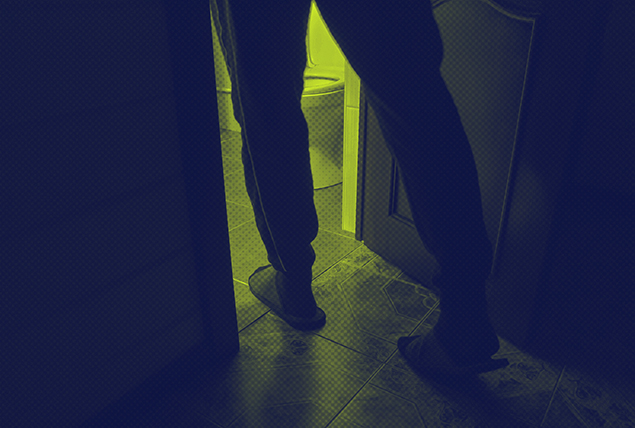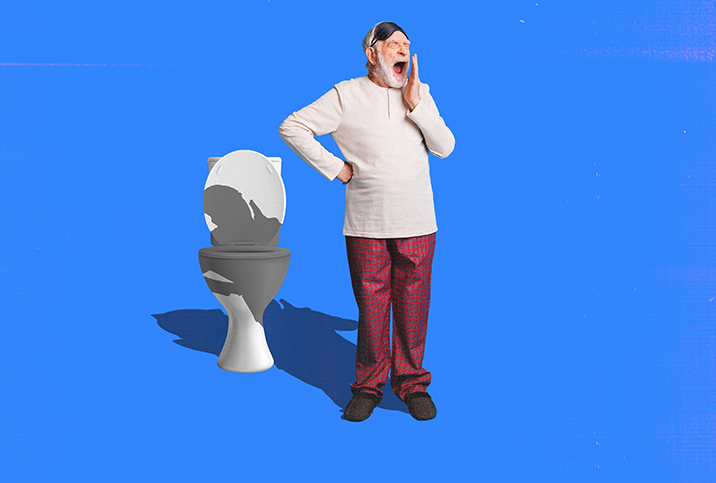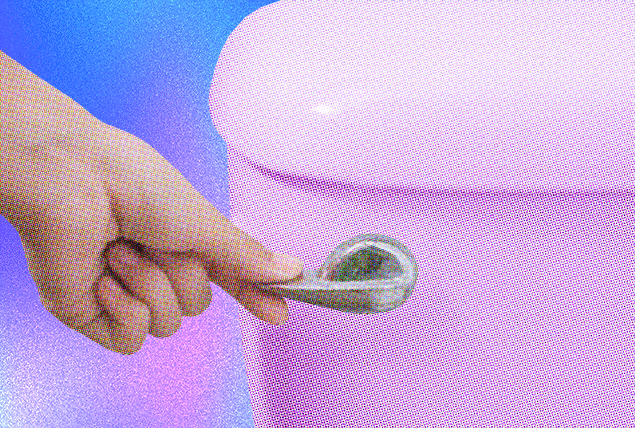Nocturia Might Be Why You Wake Up at 3 a.m. to Pee

Do you often wake out of a deep sleep with an urgent need to urinate? Your doctor may diagnose you with and treat you for nocturia, a common urological condition experienced by about 1 in 3 people more than 30 years old, according to the National Library of Medicine.
"Nocturia can be a symptom of an underlying medical condition or simply a result of certain lifestyle factors, like drinking too many fluids before bedtime or consuming diuretic substances," said James J. Elist, M.D., a urologist in Beverly Hills, California, who specializes in impotence and male sexual dysfunction.
Do you find yourself asking, "Why do I wake up at 3 a.m. to pee?" You might need to seek a diagnosis and treatment for nocturia.
What are the symptoms and causes of nocturia?
In addition to an urgent need to wake up one or more times during the night to urinate, nocturia can manifest in several other ways, according to Elist. These can include the following:
- An increased need to urinate during the day
- Difficulty starting urination
- A weak urine flow
- Pain or discomfort during urination
- Fatigue or daytime sleepiness
Research suggests age, weight, race and gender all play a role in someone's likelihood of developing nocturia, according to David Shusterman, M.D., the chief physician and founder of New York Urology in New York City. Black and Hispanic men and women older than 40 years old are more prone to nocturia. Women who have had multiple pregnancies are also more likely to experience nocturia.
What causes nocturia? Several things. Nocturia can be caused by habits and lifestyle factors such as drinking fluids before bedtime, consuming alcohol or caffeine in the few hours before bedtime, smoking and a physically inactive lifestyle.
In addition, age, medications, medical conditions and hormonal changes—those that occur during pregnancy and menopause are the most obvious—are factors.
When should you seek medical care for nocturia?
Every person's experience with nocturia is different, and your symptoms could range from mild to severe depending on how many times you need to wake during the night to urinate and how difficult it is to fall asleep again. Elist said the severity of nocturia you experience can also depend on its underlying cause.
"If the frequent urination is due to a urinary tract infection, the symptoms may be relatively mild and resolve with treatment," Elist said. "However, if the frequent urination is due to an underlying medical condition such as diabetes or kidney disease, the symptoms may be more severe and require ongoing management."
When nocturia starts to impact your quality of life or your ability to perform daily activities such as driving or concentrating, make an appointment with your primary care physician. They may enlist a urologist or nephrologist in evaluating, treating and preventing complications that may accompany the condition.
"If a person is experiencing frequent nighttime urination or other urinary symptoms that are interfering with their quality of life, they should consider seeking medical attention," Elist said. "If they are experiencing other symptoms such as fever, pain or blood in the urine, they should seek medical attention right away."
How is nocturia diagnosed?
Your primary care physician and specialists such as urologists and nephrologists diagnose nocturia with techniques that involve your medical history, a physical examination, and diagnostic tests or labs.
Your medical history is a key component of a nocturia diagnosis. As such, your doctor will ask you questions about your symptoms, the medications you're taking, and your behaviors, habits and lifestyle. Elist recommended you mention every symptom you're experiencing so the doctor can effectively reach the root cause of your frequent nighttime urination.
A physical examination—a pelvic exam for women or a prostate exam for men—will allow your doctor to locate any physical abnormalities. If your primary care provider feels additional evaluation or treatment is best, they may refer you to a urologist or nephrologist.
"These specialists have expertise in urinary and kidney-related conditions and can perform additional tests or procedures to determine the underlying cause of nocturia," Elist said. "In some cases, a sleep specialist may also be involved in the evaluation and treatment of nocturia, particularly if the frequent urination is related to a sleep disorder such as sleep apnea."
Elist said your doctor may utilize one or more diagnostic tests in confirming a nocturia diagnosis:
- Urinalysis. This test examines a sample of urine for the presence of blood, protein, bacteria or other substances that may indicate an underlying condition.
- Blood tests. Blood tests are used to identify underlying health conditions that may be causing your nocturia, including diabetes, kidney disease or hormone imbalances.
- Post-void residual (PVR) measurement. This test measures the amount of urine left in the bladder after urination to determine if there is an issue with the bladder emptying.
- Imaging. Ultrasound, MRI and CT scans can help identify problems occurring in your urinary tract and nearby.
- Urodynamic testing. This test involves measuring the pressure in the bladder and the flow of urine to help diagnose bladder function issues.
- Sleep study. If your frequent urination is related to a sleep disorder such as sleep apnea, a sleep study will be useful.
How is nocturia treated?
The treatment plan you receive for nocturia will depend on what's causing your frequent urination, which can range from lifestyle habits to underlying medical conditions.
"In some cases, lifestyle modifications such as reducing fluid intake before bedtime or limiting alcohol and caffeine consumption may help reduce nocturia symptoms," Elist said. "Other treatment options may include medications to reduce urine production or relax bladder muscles, as well as treatment of underlying medical conditions [causing your nocturia] such as diabetes or sleep apnea."
Nocturia is generally treated with a combination of lifestyle changes and medication. Shusterman said doctors use a few common treatment plans for nocturia, depending on its root cause:
- If your nocturia is caused by an enlarged prostate, it's treated with medications or procedures to shrink the prostate to alleviate nocturia symptoms.
- If you experience nocturia due to having diabetes, treatment for your diabetes—either beginning it, resuming it or maintaining it—can alleviate symptoms of nocturia.
- If your nocturia is secondary to bladder issues, oral medications can be prescribed. In some cases, a doctor may administer bladder Botox injections.
- If you're experiencing nocturia because of your habits or lifestyle, don't drink water four hours before bedtime, avoid caffeine and alcohol eight hours before bedtime, and make it a habit to try urinating before you go to bed.
What happens if you don't diagnose and treat nocturia?
If you don't seek medical attention to diagnose and treat your nocturia, many health complications and other health conditions can occur. It's best to speak with your doctor about your frequent nighttime urination and any other symptoms of nocturia you may be experiencing. Especially if you find yourself waking up on the toilet.
Ignore nocturia and you risk developing other conditions and problems, including the following:
- Daytime fatigue and sleepiness. Frequent nighttime urination can disrupt sleep and lead to daytime fatigue and sleepiness, which can impact a person's quality of life and ability to perform daily activities.
- Increased risk of falling. Older adults who may have balance or mobility issues are particularly susceptible to falls.
- Mental health disorders, including depression and anxiety. The disruption to sleep and its impact on someone's daily functioning can deteriorate one's mental health and potentially lead to depression and anxiety.
- Difficulty concentrating. Daytime fatigue and sleepiness can decrease a person's productivity and ability to concentrate at work or school.
- Urinary tract infections (UTIs). This condition can occur if a person has difficulty fully emptying their bladder during each urination.
- Aggravation of underlying medical conditions. Nocturia can be a symptom of underlying medical conditions such as diabetes or prostate problems. If left untreated, these conditions can worsen over time.
- Weight gain.
- An increase in blood pressure.
Having to wake regularly to pee in the middle of the night may seem like a minor irritation, but it may point to a larger problem. Don't ignore nocturia. If you experience symptoms, see your primary care physician for diagnosis and treatment. They may be able to show you how to avoid waking up to pee.


















